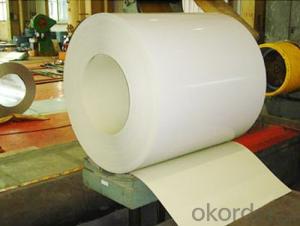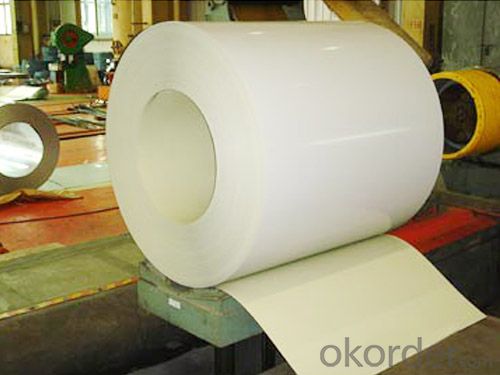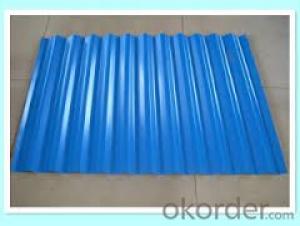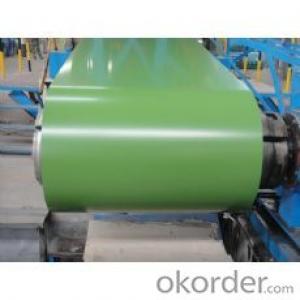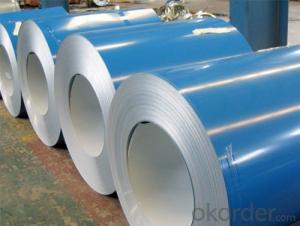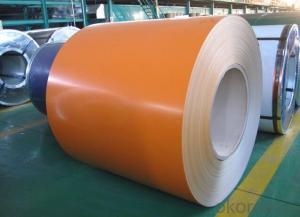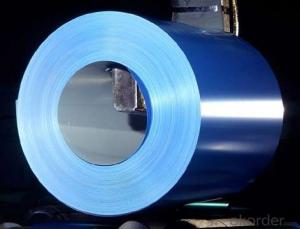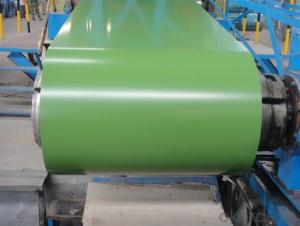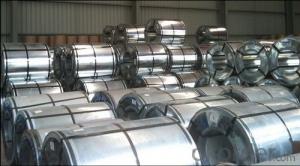PPGI Steel Sheet Coil with Nice Quality and Lowest Price Blue
- Loading Port:
- Shanghai
- Payment Terms:
- TT OR LC
- Min Order Qty:
- 111 m.t.
- Supply Capability:
- 11111 m.t./month
OKorder Service Pledge
OKorder Financial Service
You Might Also Like
1.Structure of Pre-painted Galvanized/Aluzinc Steel Coil Description
Pre-painted galvanized steel is good capable of decoration, molding, corrosion resistance.
It generally displays workability, durability and weather resistance.
2.Main Features of the Pre-painted Galvanized/Aluzinc Steel Coil
• good corrosion resistance
• perfect weather resistance
• Good formability
• Good visual effect
• High strength
3.Pre-painted Galvanized/Aluzinc Steel Coil Images
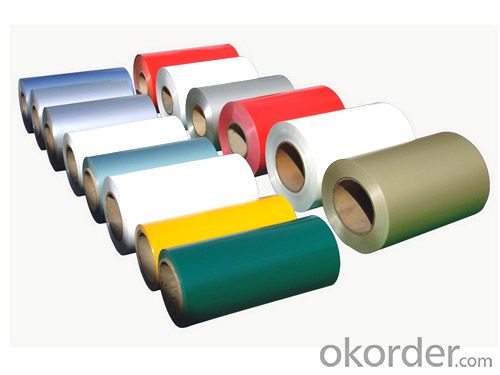
4.Pre-painted Galvanized/Aluzinc Steel Coil Specification
Paint thickness for top side : 5 micron primer + (10-20) microns modified polyester, any RAL color code.
Thickness : 0.14-1.20 mm
Paint thickness for back side: (5-10) microns Epoxy
Weight per coil: 4-6 tons, also can be upon customer's requirements
Quality standar: JIS G3312 CGCC & CGLCC
Hardness of P: Both soft and hard quality are available
Surface finish: with or without protect film
Width : 914mm, 1000mm, 1220mm and 1250mm, thickness 600-1250mm is available
Finish by coil or sheet: Both sheet and coil are available
8Zinc coating: 60-275G/M2, both sides
Max loading weight in one 20ft container : 25 tons generally
5. FAQ of Pre-painted Galvanized/Aluzinc Steel Coil
We have organized several common questions for our clients,may help you sincerely:
1. What is the minimum order quantity ?
Our MOQ is 50mt for each size. And we will consider to give more discount if you make big order like 1000 tons and more. Further more, the more appropriate payment term your offer the better price we can provide.
- Q: Can steel coils be coated with QR codes?
- Yes, steel coils can be coated with QR codes.
- Q: Can steel coils be used in the production of aerospace components?
- Indeed, the utilization of steel coils is feasible for the manufacturing of aerospace components. Steel, being a robust and adaptable substance, possesses an outstanding ratio of strength to weight, rendering it appropriate for a multitude of purposes in the aerospace sector. The processing and manipulation of steel coils allow for the fulfillment of precise specifications, including the creation of intricate components, structural elements, and even utilization in aerospace engines. Moreover, the corrosion resistance characteristics and capability to endure extreme temperatures make steel a dependable selection for aerospace applications.
- Q: How are steel coils used in the manufacturing of household goods?
- Household goods rely on steel coils for their manufacturing, utilizing them in various ways. One notable application is in the creation of appliances like refrigerators, washing machines, and ovens. These coils are skillfully molded and formed into different parts and components, fortifying the final product with durability and robustness. Moreover, furniture manufacturing frequently incorporates steel coils, specifically in constructing metal frames for chairs, tables, and bed frames. The coils can be bent, welded, or molded to desired specifications, providing a solid and dependable foundation for these essential household items. Additionally, steel coils find utility in the production of kitchen utensils and cookware. These coils can be expertly stamped or pressed into diverse shapes, including pots, pans, and cutlery. Consequently, this process generates long-lasting and heat-resistant products that are indispensable for everyday cooking and food preparation. In essence, steel coils assume a critical role in the manufacturing of household goods, imparting strength, durability, and adaptability to a wide array of products.
- Q: How are steel coils welded together?
- Different methods can be employed to weld steel coils together, depending on the specific requirements and the type of steel being used. Electric resistance welding (ERW) is a common method where an electric current is utilized to generate heat in the coils, melting their edges. Pressure is then applied to join them together. ERW is a cost-effective and speedy technique for welding steel coils. Thinner steel coils are often welded using high-frequency induction welding (HFIW). This involves the use of an induction coil to produce an alternating magnetic field, inducing an electric current in the coils. The resistance of the coils to this current generates heat, causing the edges to melt and form a weld. For thicker and heavier steel coils, submerged arc welding (SAW) is commonly employed. This technique utilizes a granular flux and a continuous electrode that is fed into the weld area. The flux melts, creating a protective shield for the weld pool, while the electrode melts to form the weld. SAW is a robust and efficient method for welding steel coils. In addition to these methods, laser welding and gas metal arc welding (GMAW) can also be utilized for welding steel coils. Laser welding offers high precision and speed, while GMAW, also known as MIG welding, utilizes an electric arc between a consumable wire electrode and the steel coils to create a weld. Irrespective of the welding method employed, successful welding of steel coils hinges on proper edge preparation, maintenance of appropriate heat and pressure levels, and the use of correct welding techniques.
- Q: How are steel coils used in the production of electrical conduits?
- Steel coils are used in the production of electrical conduits in several ways. Firstly, steel coils are used as the raw material for manufacturing electrical conduits. These coils are made of high-quality steel that is specially processed and formed into a long, continuous strip. Once the steel coils are obtained, they are fed into a machine called a slitter. The slitter cuts the coils into narrower strips of the desired width. These narrower strips will serve as the base material for the electrical conduits. The next step is to shape the steel strips into the desired conduit shape. This is done by passing the strips through a series of rollers and other shaping tools. The steel strips are gradually formed into the round or rectangular shape of the conduit. The rollers apply pressure and manipulate the steel strip until it reaches the desired shape. After the shaping process, the ends of the steel strips are welded together to create a continuous conduit. This welding process ensures that the conduit will have a seamless structure, which is important for its functionality and durability. Once the conduits are formed and welded, they undergo further processing to enhance their properties. This may include processes such as galvanizing, where the conduits are coated with a layer of zinc to protect them from corrosion. This additional layer provides the conduits with increased longevity, making them suitable for various electrical applications. In summary, steel coils are essential in the production of electrical conduits. The coils serve as the raw material that is shaped, welded, and processed to create the final product. The use of steel coils ensures that the electrical conduits are strong, durable, and capable of withstanding the demands of electrical installations.
- Q: How do steel coils contribute to the agricultural sector?
- The agricultural sector benefits greatly from the use of steel coils in various ways. To begin with, these coils are instrumental in the production of agricultural machinery and equipment such as tractors, harvesters, and irrigation systems. These machines are indispensable for carrying out farming operations efficiently, thereby helping farmers increase productivity and cut down on labor costs. The robustness and durability of steel coils ensure the machinery's ability to endure the harsh conditions of the agricultural environment. Furthermore, steel coils find application in the construction of storage facilities and warehouses for agricultural products. To safeguard crops from damage, these structures must be strong and resistant to external elements. Steel coils provide the required strength and stability for the construction of such storage facilities, thereby ensuring the secure storage of agricultural produce. In addition, steel coils are employed in the fabrication of fencing and other agricultural infrastructure. Fencing is of utmost importance in protecting crops from animals and trespassing. Steel coils serve as a robust material for fencing, guaranteeing the security and protection of agricultural lands. Moreover, steel coils are utilized in the manufacture of irrigation pipes and systems. Efficient irrigation is crucial for the growth and yield of crops, particularly in areas with limited water resources. Steel coils are used to create pipes capable of withstanding high pressure and resistant to corrosion, thereby ensuring the effective distribution of water throughout agricultural fields. In conclusion, steel coils play a vital role in the agricultural sector, providing the necessary materials for manufacturing machinery, constructing storage facilities, fencing, and irrigation systems. The strength, durability, and resistance to harsh conditions make steel coils an essential component in enhancing agricultural productivity, protecting crops, and ensuring efficient farming practices.
- Q: Are steel buildings or homes better then wooden buildings? Why?
- Arch steel buildings are extremely easy to put up as compared to other conventional structures you don't need any type of heavy equipment to erect your steel arch buildings. Most of the people put their steel buildings up with the help of family or friends in just a couple of days.
- Q: What is the process of pickling and oiling steel coils?
- To ensure the quality and protection of steel coils, a series of steps are undertaken in the process of pickling and oiling. The first step involves pickling, wherein impurities and scale are removed from the surface of the steel coil. This is achieved by immersing the coil in an acid bath, such as hydrochloric acid or sulfuric acid, which effectively dissolves any oxides, rust, or contaminants present on the surface. This step is critical as it readies the steel for further processing and safeguards against potential defects or corrosion. Following pickling, the steel coils are rinsed with water to eliminate any residual acid and then dried. Once they are clean and dry, a layer of oil is applied to provide temporary corrosion protection and lubrication during subsequent handling and transport. The oil coating acts as a barrier, preventing rusting or oxidation before the steel undergoes further processing or is utilized in various applications. The oiling process can be executed through various methods. One common approach is to apply the oil using a roller or brush, ensuring an even coating across the entire surface of the coil. Alternatively, the coils can be passed through a bath or spray chamber where the oil is administered. The choice of oil depends on the specific requirements of the steel and its intended use, with options ranging from mineral oil and synthetic oils to specialized rust-preventive coatings. Once the oiling process is complete, the steel coils are typically stacked, wrapped, or packaged for storage or transportation. It is crucial to handle the coils with care to avoid damaging the oil coating and compromising the corrosion protection it provides. Overall, the pickling and oiling of steel coils are indispensable steps in the steel manufacturing process. They ensure the quality, cleanliness, and protection of the steel, thereby prolonging its lifespan and enhancing its performance in various applications.
- Q: I know you can still but steel core ammo. I have read that it IS Armor Piercing (AP) and I have read it is not. Which is true? I am not looking for its AP capabilities. I want it if it is or is not AP. I live in Oklahoma. I need to know if it legal for me to purchase it in this state; and where can i get it? I am over 18, not a felon, etc. I have seen it sold online in Oklahoma years ago, but have read it is and isn't legal to purchase here. I am looking for 7.62x39 steel core for an SKS. If anyone knows where or how to get some, please let me know, if it's legal. Thanks.
- If it is the same stuff I have seen before it is NOT AP stuff. The steel core is a mild steel that is used as a filler to give the bullet a longer bearing surface by reducing the weight that would have been the additional lead core. If the bullet was filled with all lead it would be over the weight desired for the load OR the projectile would be shorter making it less stable in flight. Also lead is a more costly metal to use than the cheap mild steel that China is producing. Anyone that has bought a tool at Wally World, BLOWES, Or HOMERS DESPOT in the last decade can vouch for how cheap the Chinese steel is...
- Q: I am about to do a welding project and we are instructed to only use mild steel. I want to use found objects like coins, spoons, bottle caps, screws, and other small fasteners. Are these mild steel? What other objects can I use that are mild steel?
- not really. Coins aren't usually made from steel (e.g. an US cent is mainly zinc which will melt with releasing toxic fumes while welding), spoons are usually stainless steel (which is not mild steel), bottle caps can be steel but also aluminum. Fasteners can be made from a wide variety of metals. Generally mild steel is steel with a relatively low content of carbon (2%) which makes it easier to weld. It's used a lot for structure in building (e.g. rebar). Mild steel is also cheaper than other kinds of steel. Tools are usually made from high carbon steel. Generally I'd recommend to go to the scrap yard and pick up some shapes and pieces you like if you don't mind having to clean the rust off. Most will be mild steel. Welding small and thin pieces is much more challenging than welding larger pieces of metal. You are more likely to melt a bottle cap than weld it. Also your steel needs to be clean (no paint, sandblast or brush rust off). I would highly recommend to talk your project over with your teacher before you get all frustrated.
Send your message to us
PPGI Steel Sheet Coil with Nice Quality and Lowest Price Blue
- Loading Port:
- Shanghai
- Payment Terms:
- TT OR LC
- Min Order Qty:
- 111 m.t.
- Supply Capability:
- 11111 m.t./month
OKorder Service Pledge
OKorder Financial Service
Similar products
Hot products
Hot Searches
Related keywords
